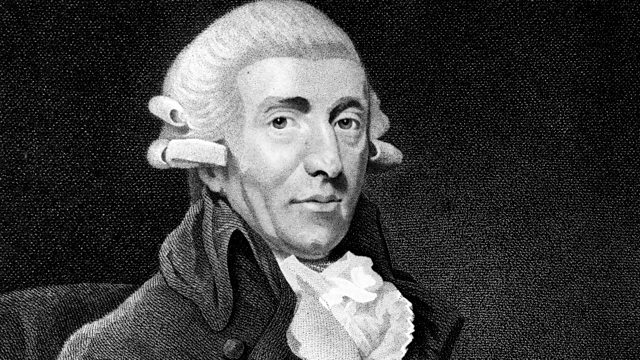
And So to London
Donald Macleod focuses on Haydn's second and final trip to London in the mid-1790s: a visit that would accompany the composition of his last three keyboard sonata masterpieces.
Donald Macleod explores Haydn's second and final trip to London in the mid 1790s - a trip that would accompany the composition of his last three keyboard sonata masterpieces.
Joseph Haydn's rightly lionised by music history as the "Father of the Symphony" - a man who took a nascent form and turned it into the very apex of musical composition. Repeating the trick with another benchmark musical genre seems almost greedy of him - and yet, with more than eighty masterful examples, Haydn's dubbed the "Father of the String Quartet" too. Which makes the neglect of one area of his musical output rather puzzling. Haydn wrote more than sixty keyboard sonatas, spanning a remarkable half-century in music history. This period saw harpsichords and clavichords replaced by the forerunners of the modern piano, and - more than that - keyboard music go from light dance suites to the sonata: a form that would shortly be taken by Mozart, Beethoven and Schubert into the very highest pinnacle of musical art. None of this could have happened without Haydn. And yet, his array of sonatas lag behind the fame and appreciation of his symphonies and quartets. This week, Donald Macleod puts that right: with no fewer than fourteen examples, in the hands of fourteen virtuoso pianists from the last century, with a supporting cast of musical excerpts from opera, chamber and vocal works.
Haydn would write his final three sonatas for keyboard around the time of his second visit to London, for the acclaimed pianist Therese Jansen. Donald Macleod ends the week with a complete performance of all three, in the hands of Alfred Brendel, Malcolm Bilson, and a remarkable recent recording by the young Polish virtuoso Rafal Blechacz.
Haydn
Sonata No 61 in D major, Hob.XVI:51
Alfred Brendel, piano
Haydn
Sonata No 60 in C major, Hob.XVI:50
Malcolm Bilson, fortepiano
Haydn
Nor Can I Think My Suit Is Vain; Thy Great Endeavours (Mare Clausum)
Tölzen Knabenchor
Tafelmusik
Bruno Weil, conductor
Haydn
Sonata No 62 in E flat major, Hob.XVI:52
Rafal Blechacz, piano.
Last on
More episodes
Next
You are at the last episode
Music Played
-
![]()
Joseph Haydn
Sonata in D major H.16.51
Performer: Alfred Brendel.- DECCA : 478-1369.
- DECCA.
- 3.
-
![]()
Joseph Haydn
Sonata in C major H.16.50
Performer: Malcolm Bilson.- CLAVES : 50-2501.
- CLAVES.
- 1.
-
![]()
Joseph Haydn
Nor can I think...Thy great endeavours - Cantata H.24a.9
Performer: Tafelmusik. Performer: Tolz Boys' Choir. Conductor: Bruno Weil.- Sony Classical: SK 66260.
- SONY CLASSICAL.
- 7.
-
![]()
Joseph Haydn
Sonata in E flat major H.16.52
Performer: Rafał Blechacz.- DEUTSCHE GRAMMOPHON : 477-7453.
- DEUTSCHE GRAMMOPHON.
- 3.
Broadcasts
- Fri 21 Jul 2017 12:00����ý Radio 3
- Fri 21 Jul 2017 18:30����ý Radio 3
Beethoven Unleashed – the box set
What was really wrong with Beethoven?
Composers A to Z
Who knew? Five eye-opening stories from Composer of the Week
Five reasons why we love Parry's Jerusalem
What is the strange power of Jerusalem which makes strong men weep?
A man out of time – why Parry's music and ideas were at odds with his image...
The composer of Jerusalem was very far from the conservative figure his image suggests.
Composer Help Page
Find resources and contacts for composers from within the classical music industry.





